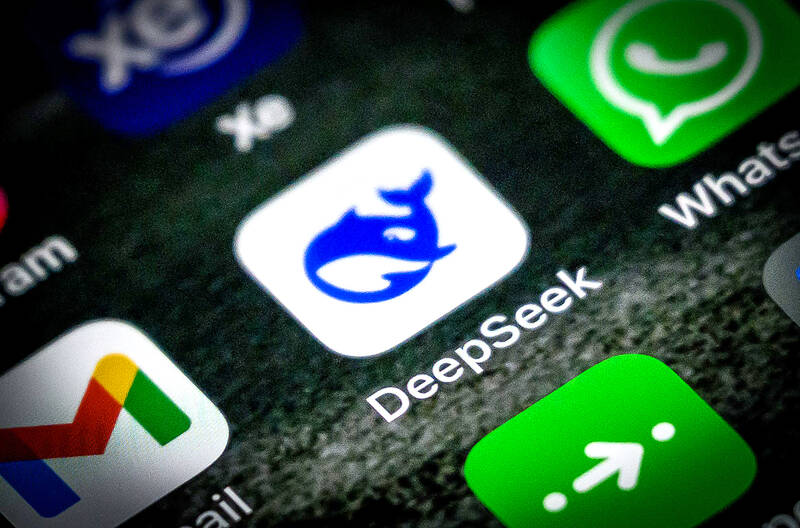China’s reported breakthrough in artificial intelligence (AI) would prompt the US to seek a stronger alliance with Taiwan and Japan to secure its technological superiority, a Taiwanese researcher said yesterday.
The launch of low-cost AI model DeepSeek (深度求索) on Monday sent US tech stocks tumbling, with chipmaker Nvidia Corp losing 16 percent of its value and the NASDAQ falling 612.46 points, or 3.07 percent, to close at 19,341.84 points. On the same day, the Philadelphia Stock Exchange Semiconductor Sector index dropped 488.7 points, or 9.15 percent, to close at 4,853.24 points.
The launch of the Chinese chatbot proves that a competitor can always catch up to the leader in AI technology, Jeremy Chang (張智程), chief executive officer of the National Science and Technology Council’s Research Institute for Democracy, Society and Emerging Technology, wrote on Facebook.

Photo: AFP
Choke points do not exist in the battle to dominate AI technology and the US must maintain its advantage in computing as the only reliable defense of its technological superiority, he said.
Under these conditions, Taiwan, Japan and South Korea, the world’s leading chipmakers, would gain greater strategic value to Washington, even beyond what their position in the first island chain affords them, he said.
The defense alliance between the US and first island chain nations would likely undergo a shift from geopolitical to technological significance as the competition for AI tech heats up, Chang said.
That means the US cannot lose the first island chain, as the loss of the technological advantages associated with the countries could not be made up for with military means, Chang said.
US President Donald Trump’s administration would surely take notice of the importance of securing access to advanced semiconductors from regional partners to protect the US’ technology sectors, he said.
Should China’s Huawei Technologies Co (華為) overtake Taiwan and South Korea in chip supply chains, Beijing would have succeeded in supplanting the power of Western nations with a China-dominated global order, he said.
Taiwan faces a golden opportunity to upgrade its relationship with Washington so long as a pro-US government is in Taipei, but the nation also faces steep risks due to political instability, he said.
However, Taipei-based Japanese journalist Akio Yaita said that DeepSeek’s claims of creating an affordable AI cannot be ruled out as a figment of Chinese propaganda.
Beijing could have invested in DeepSeek far beyond the publicly registered capital of 10 million yuan (US$1.38 million) to prop up the claim that China invented cheap AI tech, he said.

The Central Election Commission has amended election and recall regulations to require elected office candidates to provide proof that they have no Chinese citizenship, a Cabinet report said. The commission on Oct. 29 last year revised the Measures for the Permission of Family-based Residence, Long-term Residence and Settlement of People from the Mainland Area in the Taiwan Area (大陸地區人民在台灣地區依親居留長期居留或定居許可辦法), the Executive Yuan said in a report it submitted to the legislature for review. The revision requires Chinese citizens applying for permanent residency to submit notarial documents showing that they have lost their Chinese household record and have renounced — or have never

A magnitude 5.6 earthquake struck off the coast of Yilan County at 12:37pm today, with clear shaking felt across much of northern Taiwan. There were no immediate reports of damage. The epicenter of the quake was 16.9km east-southeast of Yilan County Hall offshore at a depth of 66.8km, Central Weather Administration (CWA) data showed. The maximum intensity registered at a 4 in Yilan County’s Nanao Township (南澳) on Taiwan’s seven-tier scale. Other parts of Yilan, as well as certain areas of Hualien County, Taipei, New Taipei City, Taoyuan, Hsinchu County, Taichung and Miaoli County, recorded intensities of 3. Residents of Yilan County and Taipei received

Taiwan has secured another breakthrough in fruit exports, with jujubes, dragon fruit and lychees approved for shipment to the EU, the Ministry of Agriculture said yesterday. The Animal and Plant Health Inspection Agency on Thursday received formal notification of the approval from the EU, the ministry said, adding that the decision was expected to expand Taiwanese fruit producers’ access to high-end European markets. Taiwan exported 126 tonnes of lychees last year, valued at US$1.48 million, with Japan accounting for 102 tonnes. Other export destinations included New Zealand, Hong Kong, the US and Australia, ministry data showed. Jujube exports totaled 103 tonnes, valued at

BIG SPENDERS: Foreign investors bought the most Taiwan equities since 2005, signaling confidence that an AI boom would continue to benefit chipmakers Taiwan Semiconductor Manufacturing Co’s (TSMC, 台積電) market capitalization swelled to US$2 trillion for the first time following a 4.25 percent rally in its American depositary receipts (ADR) overnight, putting the world’s biggest contract chipmaker sixth on the list of the world’s biggest companies by market capitalization, just behind Amazon.com Inc. The site CompaniesMarketcap.com ranked TSMC ahead of Saudi Aramco and Meta Platforms Inc. The Taiwanese company’s ADRs on Tuesday surged to US$385.75 on the New York Stock Exchange, as strong demand for artificial intelligence (AI) applications led to chip supply constraints and boost revenue growth to record-breaking levels. Each TSMC ADR represents